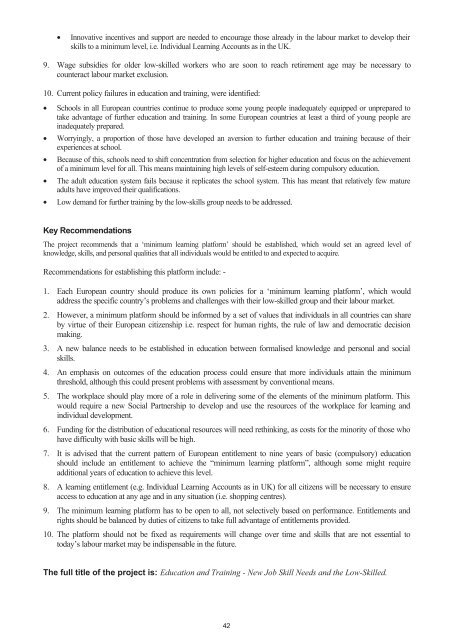briefing papers for policy makers
briefing papers for policy makers
briefing papers for policy makers
You also want an ePaper? Increase the reach of your titles
YUMPU automatically turns print PDFs into web optimized ePapers that Google loves.
• Innovative incentives and support are needed to encourage those already in the labour market to develop their<br />
skills to a minimum level, i.e. Individual Learning Accounts as in the UK.<br />
9. Wage subsidies <strong>for</strong> older low-skilled workers who are soon to reach retirement age may be necessary to<br />
counteract labour market exclusion.<br />
10. Current <strong>policy</strong> failures in education and training, were identified:<br />
• Schools in all European countries continue to produce some young people inadequately equipped or unprepared to<br />
take advantage of further education and training. In some European countries at least a third of young people are<br />
inadequately prepared.<br />
• Worryingly, a proportion of those have developed an aversion to further education and training because of their<br />
experiences at school.<br />
• Because of this, schools need to shift concentration from selection <strong>for</strong> higher education and focus on the achievement<br />
of a minimum level <strong>for</strong> all. This means maintaining high levels of self-esteem during compulsory education.<br />
• The adult education system fails because it replicates the school system. This has meant that relatively few mature<br />
adults have improved their qualifications.<br />
• Low demand <strong>for</strong> further training by the low-skills group needs to be addressed.<br />
Key Recommendations<br />
The project recommends that a ‘minimum learning plat<strong>for</strong>m’ should be established, which would set an agreed level of<br />
knowledge, skills, and personal qualities that all individuals would be entitled to and expected to acquire.<br />
Recommendations <strong>for</strong> establishing this plat<strong>for</strong>m include: -<br />
1. Each European country should produce its own policies <strong>for</strong> a ‘minimum learning plat<strong>for</strong>m’, which would<br />
address the specific country’s problems and challenges with their low-skilled group and their labour market.<br />
2. However, a minimum plat<strong>for</strong>m should be in<strong>for</strong>med by a set of values that individuals in all countries can share<br />
by virtue of their European citizenship i.e. respect <strong>for</strong> human rights, the rule of law and democratic decision<br />
making.<br />
3. A new balance needs to be established in education between <strong>for</strong>malised knowledge and personal and social<br />
skills.<br />
4. An emphasis on outcomes of the education process could ensure that more individuals attain the minimum<br />
threshold, although this could present problems with assessment by conventional means.<br />
5. The workplace should play more of a role in delivering some of the elements of the minimum plat<strong>for</strong>m. This<br />
would require a new Social Partnership to develop and use the resources of the workplace <strong>for</strong> learning and<br />
individual development.<br />
6. Funding <strong>for</strong> the distribution of educational resources will need rethinking, as costs <strong>for</strong> the minority of those who<br />
have difficulty with basic skills will be high.<br />
7. It is advised that the current pattern of European entitlement to nine years of basic (compulsory) education<br />
should include an entitlement to achieve the “minimum learning plat<strong>for</strong>m”, although some might require<br />
additional years of education to achieve this level.<br />
8. A learning entitlement (e.g. Individual Learning Accounts as in UK) <strong>for</strong> all citizens will be necessary to ensure<br />
access to education at any age and in any situation (i.e. shopping centres).<br />
9. The minimum learning plat<strong>for</strong>m has to be open to all, not selectively based on per<strong>for</strong>mance. Entitlements and<br />
rights should be balanced by duties of citizens to take full advantage of entitlements provided.<br />
10. The plat<strong>for</strong>m should not be fixed as requirements will change over time and skills that are not essential to<br />
today’s labour market may be indispensable in the future.<br />
The full title of the project is: Education and Training - New Job Skill Needs and the Low-Skilled.<br />
42


